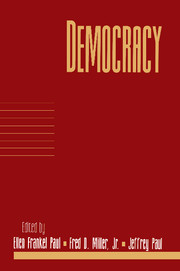Book contents
- Frontmatter
- Contents
- Introduction
- Acknowledgments
- Contributors
- The Very Idea of Popular Sovereignty: “We the People” Reconsidered
- Quasi-Rights: Participatory Citizenship and Negative Liberties in Democratic Athens
- Is There a Duty to Vote?
- Postmodern Liberalism and the Expressive Function of Law
- Democratic Epistemology and Accountability
- Political Quality
- Why Deliberative Democracy Is Different
- The Institutions of Deliberative Democracy
- Democracy as a Telos
- Radical Democracy, Personal Freedom, and the Transformative Potential of Politics
- Democracy and Value Pluralism
- The Problem of Russian Democracy: Can Russia Rise Again?
- Index
The Problem of Russian Democracy: Can Russia Rise Again?
Published online by Cambridge University Press: 03 May 2010
- Frontmatter
- Contents
- Introduction
- Acknowledgments
- Contributors
- The Very Idea of Popular Sovereignty: “We the People” Reconsidered
- Quasi-Rights: Participatory Citizenship and Negative Liberties in Democratic Athens
- Is There a Duty to Vote?
- Postmodern Liberalism and the Expressive Function of Law
- Democratic Epistemology and Accountability
- Political Quality
- Why Deliberative Democracy Is Different
- The Institutions of Deliberative Democracy
- Democracy as a Telos
- Radical Democracy, Personal Freedom, and the Transformative Potential of Politics
- Democracy and Value Pluralism
- The Problem of Russian Democracy: Can Russia Rise Again?
- Index
Summary
INTRODUCTION
While Western political scientists have a variety of opinions on democracy and how its institutions could be improved, they almost never argue about the validity of democracy as a form of government. Of course, it would be unfair here to ignore the presence of an authoritarian streak in Western thought. Thomas Hobbes comes to mind most immediately. Yet the views of those thinkers with an authoritarian bent have become marginalized in present-day discourse; or, to be more precise, it is assumed that their views on the importance of a strong government are irrelevant to the present. The assumption that a strong regime might be necessary in non-Western societies is thought to be the product of these authoritarian/totalitarian societies' elite classes–that is, a justification for imposing the power of the elite upon the people. Most Western political scientists are convinced that democracy is the best of all possible forms of government.
For this reason, in discussions of political reform in Russia and other formerly communist countries, it is taken for granted that democracy is the goal of the present-day political process. Yet democratic institutions are not universally applicable, at least in their Western form. The point here is that the functioning of democratic institutions cannot be separated from civil society. I use the term ‘civil society’ in the following way. First, I am referring to those institutions that emerge at the grassroots level and exist independently from the state at the grassroots level.
- Type
- Chapter
- Information
- Democracy , pp. 269 - 314Publisher: Cambridge University PressPrint publication year: 2000
- 1
- Cited by

